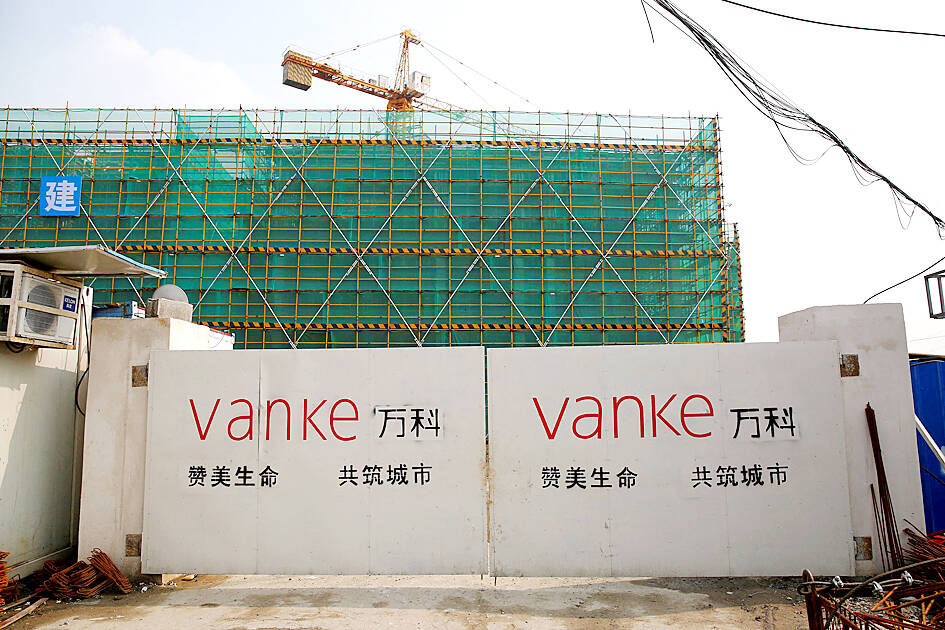China Vanke Co (萬科) chairman and chief executive officer would both resign in an abrupt move after the embattled developer warned of a record 45 billion yuan (US$6.2 billion) loss for last year.
Chairman Yu Liang (郁亮) applied to resign due to “work adjustment reasons,” but would remain as a director of the company, Vanke said in a filing to the Hong Kong stock exchange yesterday.
Chief executive officer Zhu Jiusheng (祝九勝) is also stepping down, citing “health reasons.” He would no longer hold any positions at the company.

Photo: Reuters
Shenzhen Metro Group Co (深圳市地鐵集團) chairman Xin Jie (辛杰) would replace Yu. The state-owned subway operator is Vanke’s largest shareholder.
The developments underscore the sense of alarm at the Shenzhen-based developer, which has taken center stage in China’s prolonged property slump after dozens of its peers defaulted.
Vanke risks a similar fate as it faces a wall of debt repayments at a time when losses are widening and home sales continue to tank.
The preliminary net loss is the developer’s first on an annual basis since its 1991 listing and more than doubles analysts’ projections for a loss of 21.8 billion yuan, data compiled by Bloomberg showed.
The full-year amount includes a 17.9 billion yuan loss in the first nine months of last year, suggesting operations worsened significantly during the final quarter even as the government unveiled its biggest package to revive the housing market.
Before joining Vanke, Zhu spent 19 years at state lender China Construction Bank Corp’s (中國建設銀行) Shenzhen branch. With a doctoral degree in economics, Zhu joined the developer in 2012, first as a senior vice president and later overseeing finance operations. He spearheaded new businesses including China’s first public real estate investment trust, underpinned by Vanke’s office buildings.
In 2018, he took over the president and chief executive officer roles from Yu, who shifted his focus to Vanke’s long-term strategy. In a media briefing that year, Yu described Zhu as a bookworm and outspoken within the company.
A graduate of Peking University, Yu joined Vanke in 1990, two years after the developer began to transform itself from a trading firm into a real estate juggernaut.
After overseeing the company’s stock listing and investments in his early years, Yu worked as the general manager for 16 years. In 2017, he took the presidency role from founder Wang Shi (王石) after an ownership tussle that ended with a state entity becoming its biggest investor.
In later years, Yu dominated Vanke’s diversification into non-traditional businesses, including rental apartments and logistics, as China’s urbanization entered its later stage.
The company was forced to exit non-core operations and divest assets last year as the property downturn dragged on.
Just like his predecessor, Yu has climbed Mount Everest and run marathons, local media has reported.

SEMICONDUCTORS: The German laser and plasma generator company will expand its local services as its specialized offerings support Taiwan’s semiconductor industries Trumpf SE + Co KG, a global leader in supplying laser technology and plasma generators used in chip production, is expanding its investments in Taiwan in an effort to deeply integrate into the global semiconductor supply chain in the pursuit of growth. The company, headquartered in Ditzingen, Germany, has invested significantly in a newly inaugurated regional technical center for plasma generators in Taoyuan, its latest expansion in Taiwan after being engaged in various industries for more than 25 years. The center, the first of its kind Trumpf built outside Germany, aims to serve customers from Taiwan, Japan, Southeast Asia and South Korea,

Gasoline and diesel prices at domestic fuel stations are to fall NT$0.2 per liter this week, down for a second consecutive week, CPC Corp, Taiwan (台灣中油) and Formosa Petrochemical Corp (台塑石化) announced yesterday. Effective today, gasoline prices at CPC and Formosa stations are to drop to NT$26.4, NT$27.9 and NT$29.9 per liter for 92, 95 and 98-octane unleaded gasoline respectively, the companies said in separate statements. The price of premium diesel is to fall to NT$24.8 per liter at CPC stations and NT$24.6 at Formosa pumps, they said. The price adjustments came even as international crude oil prices rose last week, as traders

SIZE MATTERS: TSMC started phasing out 8-inch wafer production last year, while Samsung is more aggressively retiring 8-inch capacity, TrendForce said Chipmakers are expected to raise prices of 8-inch wafers by up to 20 percent this year on concern over supply constraints as major contract chipmakers Taiwan Semiconductor Manufacturing Co (TSMC, 台積電) and Samsung Electronics Co gradually retire less advanced wafer capacity, TrendForce Corp (集邦科技) said yesterday. It is the first significant across-the-board price hike since a global semiconductor correction in 2023, the Taipei-based market researcher said in a report. Global 8-inch wafer capacity slid 0.3 percent year-on-year last year, although 8-inch wafer prices still hovered at relatively stable levels throughout the year, TrendForce said. The downward trend is expected to continue this year,

POWERING UP: PSUs for AI servers made up about 50% of Delta’s total server PSU revenue during the first three quarters of last year, the company said Power supply and electronic components maker Delta Electronics Inc (台達電) reported record-high revenue of NT$161.61 billion (US$5.11 billion) for last quarter and said it remains positive about this quarter. Last quarter’s figure was up 7.6 percent from the previous quarter and 41.51 percent higher than a year earlier, and largely in line with Yuanta Securities Investment Consulting Co’s (元大投顧) forecast of NT$160 billion. Delta’s annual revenue last year rose 31.76 percent year-on-year to NT$554.89 billion, also a record high for the company. Its strong performance reflected continued demand for high-performance power solutions and advanced liquid-cooling products used in artificial intelligence (AI) data centers,